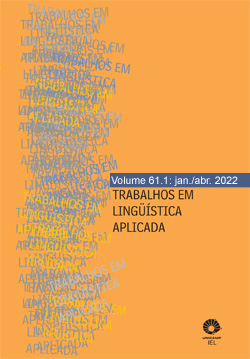Abstract
This work aims to reflect the pedagogical practices that use blackface, in the wrong way, in the search for the valorization of Afro-Brazilian and African history and culture. To achieve this goal we used as theoretical contribution Munanga (2008), Hall (2016), Souza (2011) and Silva (2014). The methodology used was the qualitative analysis of structured and semi-structured interviews with teachers in the Early Childhood and Elementary Education segment I. Finally, it was understood that teachers do not know what blackface is about, even practicing, because this is the result of a formation with eurocentric curriculum that reproduces a racist discourse and without the information on the subject continue to be engendered in schools, “consumed” by students and reproduced by them also, in a continuous cycle of repetition, whose interruption will only be made possible with the implementation of anti-racist practices that are in accordance with Law 10.639/2003 and its Guidelines (2004).
References
BRASIL. Ministério da Educação. Diretrizes Curriculares Nacionais para a Educação das Relações Étnico-Raciais e para o Ensino de História e Cultura Afro-Brasileira. Brasília, 2005.
BRASIL. Ministério da Educação. Lei 10.639/03. Brasília, 9 de janeiro de 2003.
CARDOSO, Lourenço. Branquitude acrítica e crítica: A supremacia racial e o branco anti-racista. Rev. latinoam. cienc. soc. niñez juv 8(1): 607-630, 2010 Disponível em: http://www.umanizales.edu.co/revistacinde/index.html > Acesso em: 08 Jul. 2019.
CARVALHO, Noel dos Santos. O cinema em negro e branco. In: SOUZA, Edileuza Penha de. (Org.). Negritude, cinema e educação: caminhos para a implementação da Lei 10.639/2003. 2. ed. Belo Horizonte: Mazza Edições, 2011. (Volume 1).
DUSCHATZKY, Silvia; SKLIAR, Carlos. Reflexões sobre os usos escolas da diversidade. Rev. Educação & Realidade. Jul./dez. 2000, p. 163-177.
FOUCAULT, Michel. A ordem do discurso. São Paulo: Edições Loyola, 2009.
GOMES, Nilma Lino. (Org.). Práticas pedagógicas de trabalho com relações étnico-raciais na escola na perspectiva da Lei nº 10.639/03. Brasília: MEC; Unesco, 2012. (Educação para todos; 36).
HALL, Stuart. Cultura e Representação. Rio de Janeiro: Editora PUC-RIO: Apicuri, 2016.
MUNANGA, Kabengele. Origens africanas do Brasil contemporâneo: histórias, línguas, culturas e civilizações. 3. ed. São Paulo: Gaudí Editorial, 2012.
MUNANGA, Kabengele. Rediscutindo a mestiçagem no Brasil: identidade nacional versus identidade negra. 3. ed. Belo Horizonte: Autêntica, 2008.
MUNANGA, Kabengele. Negritude e identidade negra ou afrodescendente: um racismo ao avesso? Revista da ABPN, v. 4 n. 8, jul - out. 2012. Disponível em: <http://www.abpnrevista.org.br/revista/index.php/revistaabpn1/article/view/246/222> Acesso em: 13 jul. 2019.
SILVA, Tomaz Tadeu da; HALL, Stuart; WOODWARD, Kathryn. Identidade e diferença: a perspectiva dos estudos culturais. 15. ed. Petrópolis, RJ: Vozes, 2014.
QUIJANO, Anibal. Colonialidade do poder, eurocentrismo e América Latina. In: A colonialidade do saber: eurocentrismo e ciências sociais. Perspectivas latino-americanas. Buenos Aires: Consejo Latinoamericano de Ciencias Sociales, 2005.

This work is licensed under a Creative Commons Attribution 4.0 International License.
Copyright (c) 2022 Trabalhos em Linguística Aplicada


